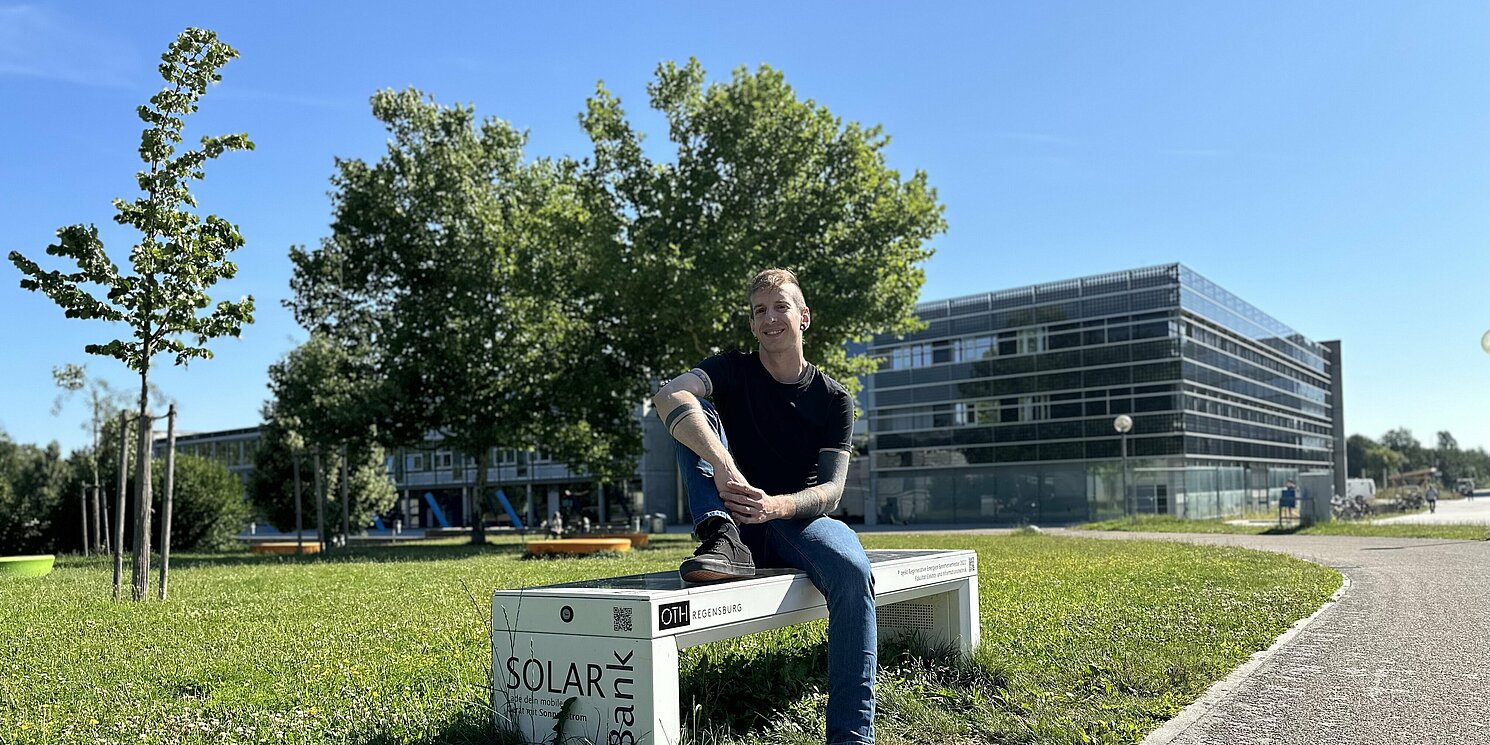Students on the Electrical and Microsystems Engineering Master's programme at OTH Regensburg usually deal with technical systems in their final theses. However, Franz Bauer, a research assistant at the Research Centre for Energy Networks and Energy Storage (FENES), has focused on mitigating climate change through behavioural measures in his cooperative doctorate at OTH Regensburg and Friedrich-Alexander-Universität (FAU) Erlangen-Nürnberg. "Currently, the focus is increasingly on technical measures in the fight against climate change. We can't do without them. However, from an economic point of view, it costs more if we focus purely on technology. We could achieve the climate targets more easily if we change our behaviour," says Bauer.
Bauer not only completed his dissertation entitled "Analysis of sufficiency potentials in the context of a sustainable transformation of the German energy system using a cross-sector optimisation model" with distinction summa cum laude, it was even nominated for the doctoral prize of the Faculty of Engineering at Friedrich-Alexander-Universität (FAU) Erlangen-Nürnberg.
In his thesis, which was supervised by Prof Dr Jürgen Karl (FAU) and Prof Dr Michael Sterner (OTHR), Bauer investigated the influence of various sufficiency measures on greenhouse gas emissions and energy demand in Germany. In the context of the energy system, sufficiency is defined as a change in individual consumption patterns in order to remain within the Earth's ecological carrying capacity. Sufficiency measures are therefore also referred to as behavioural changes aimed at limiting or reducing energy demand to a sustainable level.
Energy demand can be drastically reduced by changing behaviour
For his dissertation, the Vilshofen native developed a comprehensive energy system model that includes all generation and consumption sectors in Germany. By implementing behavioural changes combined with technical defossilisation options in the model, he was able to work out the effects of various measures for achieving ambitious climate targets. If sufficiency measures are implemented in addition to technical strategies such as efficiency increases or renewable energies, the final energy demand can be reduced by 55 per cent by the middle of the century compared to 2019. It is also possible to reduce greenhouse gas emissions by 97 per cent compared to 1990 to 27 million metric tonnes of CO2 equivalents in 2050. This reduces the amount of carbon sinks required to achieve climate neutrality in accordance with the Climate Protection Act.
"My calculations relate to Germany and are based on the assumption that all people act in an ideally sufficient manner. This is of course unrealistic, but it shows the maximum potential," says Bauer. In terms of behavioural changes, Bauer uses the classic example of the tumble dryer. It uses a lot of energy, so hanging the laundry in the garden would be the most sufficient behaviour. "But I need space and more time for that. It's not as convenient," says Bauer. In addition, his own consumer behaviour and mobility are also points that have the potential to save a lot of energy.
Bauer does not accept arguments such as "other countries consume more energy": The global North has a much higher energy consumption compared to countries in the global South. It is not socially just that we consume so much energy.
According to his findings and many other studies, food makes the greatest contribution to saving the climate among the sufficiency measures. "In terms of emissions, nutrition has the greatest effect, that is scientifically proven. Our diet is heavily based on animal products, which cause high levels of greenhouse gases. Animal feed has to be grown, fields fertilised and the animals produce emissions through digestive processes. A plant-based or vegan diet makes all the difference," says Bauer.
Another exciting result of Bauer's dissertation: a change in individual living behaviour has the lowest savings, as the energy requirements for buildings can be reduced to a very low level in future through energy-efficient renovation and efficient heating systems.
Behavioural changes would save around 42 billion euros per year
The studies also show that sufficiency measures can reduce the overall economic system costs of the energy transition by around 42 billion euros per year compared to a transformation of the energy system without behavioural changes. Overall, the results of the dissertation make it clear that the greatest possible contribution to a sustainable transformation of the energy system can be achieved through the interaction of efficiency measures, renewable energies and sufficiency measures.
Dr Franz Bauer's academic career began in 2009 with a Bachelor's degree in Renewable Energies and Energy Efficiency at OTH Regensburg. Prior to this, he had worked as a construction mechanic after secondary school and then completed his A-levels. As he wanted to gain a deeper understanding of what lies behind the machines, he decided to study at OTH Regensburg. He has been a research assistant at FENES since 2015 and has specialised in power-to-X technologies and, in particular, the modelling of energy systems as part of the multi-year Kopernikus project P2X of the German Federal Ministry of Education and Research. Bauer will remain at the university after completing his doctorate. He will continue to contribute his expertise to FENES as a research assistant (postdoc). In the IMA-GH2 project, he will focus on the topic of hydrogen and, in particular, on how the ramp-up can be accelerated.

